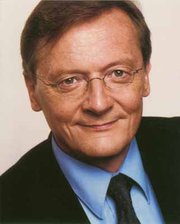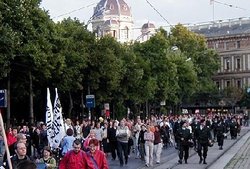|
|
Wolfgang Schüssel (born June 7, 1945) is a Christian Democratic Austrian politician. He has been Federal Chancellor of Austria ("Bundeskanzler") since 2000.
| Contents |
Early career
Born in Vienna, Schüssel attended a well-known Catholic gymnasium for boys in Vienna (the Schottengymnasium) where he took his Matura exams in 1963. He went on to study at the University of Vienna and received a Doctorate in Law in 1968.
Schüssel was secretary of the parliamentary group of the Austrian People's Party (ÖVP) from 1968 to 1975. From 1975 to 1991 he was Secretary General of the Austrian Business Federation, a sub-organisation of the Christian Democratic People's Party.
Minister in the "Grand Coalition"
He became Minister for Economic Affairs on April 24, 1989 in a coalition government under Chancellor Franz Vranitzky (SPÖ) formed by the Austrian Social Democratic Party (SPÖ) and the Austrian People's Party (ÖVP).
On April 22, 1995, at the 30th Party Congress of the ÖVP, Schüssel was elected national leader of the Austrian People's Party .
On May 4, 1995 Wolfgang Schüssel was sworn in as Vice-Chancellor and Federal Minister for Foreign Affairs in Franz Vranitzky's fourth government. He held the same posts in Chancellor Vranitzkys fifth Cabinet. In Chancellor Viktor Klima's (SPÖ) first government, from January 28, 1997 to February 4, 2000, Schüssel was again Vice-Chancellor and Federal Minister for Foreign Affairs.
Chancellor of Austria
The Schüssel I government
On February 4, 2000 Wolfgang Schüssel was sworn in as Federal Chancellor, following a defeat in the 1999 election, after which his party ended up in third place only. Until then, his party had been the junior partner in a coalition with the SPÖ. However, talks to renew that coalition failed, which induced Schüssel to enter a coalition with the FPÖ. He became Chancellor, even though his party was trailing behind its coalition partner by a few votes.
The government headed by Schüssel was - in its beginnings - probably the most controversial since 1945, which to a large extent is due to the coalition formed with the far right-wing Austrian Freedom Party (FPÖ), whose leader at that time was Jörg Haider. Although Haider was never a member of Schüssel's government, his participation raised widespread criticism, both inside and outside of Austria.
Between 2000 and 2002 there were weekly Donnerstagsdemonstrationen (Thursday Demonstrations) through the city and the inner districts of Vienna. The coalition with the Austrian Freedom Party and various policies aiming at achieving the much-maligned Nulldefizit (zero budget deficit) were the main points of criticism.
The heads the governments of the other 14 EU members decided to cease cooperation with the Austrian government, as it was felt in many countries that the cordon sanitaire against coalitions with parties considered as right-wing extremists, which had mostly held in Western Europe since 1945, had been breached. For example, for several months, other national leaders refused to shake hands and socialize with members of the Schüssel government. In Austria, this approach was often described as sanctions.
Government supporters often blamed the opposition social democrats and President Thomas Klestil for the so-called "sanctions" imposed by the EU14 and their loyalty to the country was thus put into question. Schüssel's government was the first after 30 years with a Bundeskanzler who was not a represenative of the Austrian Social Democratic Party (SPÖ). In the period from 1945 to 2000 the SPÖ was in the government for 51 years and led it for 30 years, which was claimed by government supporters to be the true reason for the demonstrations and for the so-called "sanctions".
However, it cannot be overlooked that Schüssel's ÖVP had been a member of all governments from 1945 to 1970 and from 1986 onwards, and that it had never been completely excluded from power because of the tradition of social partnership, under which representatives of all major interest groups in the country would be consulted before any policy was enacted. Since the ÖVP had always dominated the representations of farmers, businessmen and government employees, it had never been completely shut out from policymaking, also during the Kreisky era, even though its influence was considerably attenuated during that time. When Schüssel came into power, he broke with that tradition in order to be able to enact reforms that he felt to be necessary more quickly, which is probably also the reason for a lot of resentment towards him and his government.
On a diplomatic level the so-called "sanctions" carried on for months, both the Austrian government and the EU14 tried to seek a solution for the situation. Because the legal basis was international law (diplomatic retaliation on moderate level is allowed - law cannot oblige people do be nice to each other and shake hands) and not the EU-Charta, EU-law did not provide a way out. Therefore after a couple of months a delegation of 3 experts (die drei EU-Weisen) was sent to Austria to examine the political situation and to determine if the EU14's so-called "sanctions" could be lifted. Their report did not find reasons that would permit the other EU-members according to then existing EU-law to engage in further measures going beyond those that are allowed in international law. However, the more important conclusion the report draw was that a system for exactly these kind of situations should be implemented and incorporated into EU-law. This subsequently happened with the amendments to the EU-treaties in Nice in 2001.
Following the report, the EU leaders subsequently abandonned the so-called "sanctions" and returned to normality during the summer of 2000, even though the coalition remained unchanged.
The Schüssel II government
By the summer of 2002, a series of lost elections had resulted in considerable internal strife in the FPÖ, which was instigated by Haider and some of his closest allies. When the leading proponents of the more pragmatic wing of this party, Vice Chancellor Susanne Riess-Passer and Finance Minister Karl-Heinz Grasser, announced their resignation, Schüssel broke the coaltion and announced general elections, which were held prematurely in November 2002 and led to a landslide victory for Schüssel. However, after negotiating for months with both the Social Democratic Party (SPÖ) and the Green Party, Schüssel decided to renew his coalition government with the Freedom Party, which had been reduced to a mere 10 percent of the vote.
On February 28, 2003, after a landslide victory, he was sworn in as Federal Chancellor again, this time with the confidence of having won the elections.
In April 2005, the FPÖ effectively split in two parties, namely the old FPÖ and the new Alliance for the Future of Austria (BZÖ), which consists of Jörg Haider, the former FPÖ government members and most FPÖ members of the National Council of Austria, while the party base in most states remains with the old party. In spite of this change in the nature of his coalition partner, Schüssel seems determined to continue the coalition, if possible, until the end of the current legislative period.
Policies
The government's attempts at achieving a balanced budget (called "Nulldefizit") while being more successful than similar attempts in some other European countries failed. Some of the effect was reached by raising taxes and fees, but quite significant cost-cutting measures were undertaken, many of which caused significant criticism. For example, the Austrian education system has suffered considerably, as is shown by the PISA study released in 2004. Costs are being cut at universities, even though the government proclaims that it will bring teaching and research to a "world-class" level. Cost-cutting in the security sector is blamed for an increase in crime.
At the same time, Schüssel's government increased public spending in certain areas. For example, the new "Kindergeld" (children money) to help families replaced the old "Karenzgeld", which was dependent on the recipient standing in employment. This change was a nod to a Freedom Party, which had campaigned for this measure.
The decision to replace the old Draken fighter planes of the Bundesheer with 18 Eurofighters was seen as waste of money by the opposition, most of all because of the attempts to save money in almost every area of the public administration. The government's arguments for this was that the Austrian State Treaty, according to which Austria needs to be able to defend itself, is to be read to imply that Austria must be in complete control its air space. The opposition argued that this goal could have been reached in a much cheaper way.
Starting from around 2030, the unfavorable structure of the population pyramid will create a ratio of active to retired workers of 1:1. Schüssel's pension reform led to reduction of future pensions and at the same time a raising of the retirement age. Schüssel's reform of the Austrian pension system is more broad-sweeping and thus more likely to be effective than all previous reforms in this area combined. However, experts insist that it should have been still more ambitious, but despite of this fact the SPÖ and the Austrian Federation of Trade Unions (ÖGB) protested heavily and argued that the pension losses, limited by Schüssel to 10 % and later reduced to 5 %, were excessive.
Recent efforts to reform the military and to create a uniform pension system are proceeding. One result of the military reform is by many hoped to be a reduction of the mandatory military service to six months, or even an abolition of military service. From 2005 onwards, corporate tax will be reduced to 25%, which is hoped to stimulate investment and economic growth. The measure is thought to be necessary, as neighboring countries which recently entered the EU, such as Slovakia, have even lower tax rates. However, critics sometimes argue that such a tax advantage for firms is unfair to employees and may even be unconstitutional.
Wolfgang Schüssel's Private life
Schüssel keeps a low profile as far as his private life is concerned. Married with two children, he lives in Vienna and says he prefers spending his vacations in Austria. He is fond of mountaineering in the Austrian Alps (he also co-authored a tour guide) and, a lover of music, plays several instruments including the piano.
See also
- Chancellor of Austria for a complete list of Bundeskanzler since 1918
External link
- Official site of the Bundeskanzleramt (http://www.austria.gv.at/DesktopDefault.aspx?alias=english&init) (in English)
| Preceded by: Viktor Klima | Chancellor of Austria since 2000 | Succeeded by: --- |
| Preceded by: Erhard Busek | ÖVP Party Chairman since 1995 | |
| Vice Chancellor of Austria 1995–2000 | Succeeded by: Susanne Riess-Passer | |
| Preceded by: Alois Mock | Foreign Minister of Austria 1995–2000 | Succeeded by: Benita Ferrero-Waldner |


